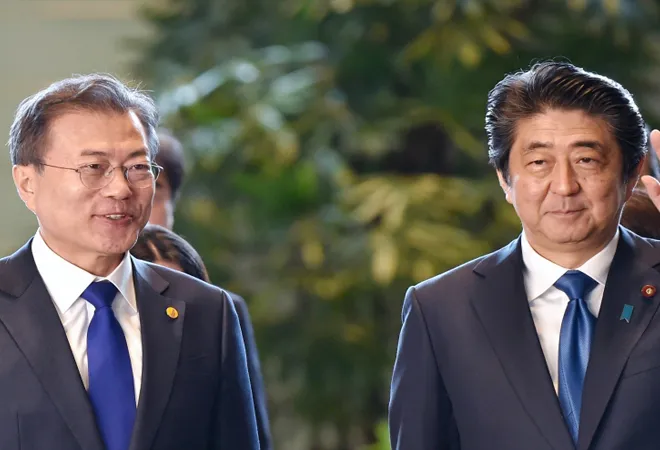-
CENTRES
Progammes & Centres
Location

Northeast Asia is the only region where the legacies of the Second World War still continue to cause tensions and strain relations -- between Japan and South Korea and between Japan and China. In particular, South Korea, despite its security commonalities with Japan, has not been able to reach lasting reconciliation with Tokyo. This has forced both Seoul and Tokyo to adopt nationalistic polices as a result.
The election of Moon Jae-in as the President of the Republic of Korea in 2017 momentarily raised some hopes that he would be different and under his leadership, both countries would move in the direction of finding a way for reconciliation.
In fact, in the initial phase following his inauguration, Moon was reported to have expressed his willingness to bury the hatchet with Japan and adopt conciliatory policies.
But many developments thereafter belied all those expectations. It all started with the issue centered on the so-called comfort women, a euphemism for hundreds of Korean women who were victims of Japan’s wartime sexual slavery. In December 2015, former President Park Geun hye and Japanese Prime Minister Shinzo Abe, after prolonged talks, struck an agreement whereby Japan agreed to provide monetary compensation to the surviving comfort women in South Korea. The agreement was considered as final and irrevocable. A foundation was set up with a fund of 1 billion yen for that purpose. Though the arrangement seemed to work for a while, very soon after the advent of Moon, there were fresh waves of protests against the Park-Abe agreement. It soon turned out to be a major political challenge to Moon. The agitation became so powerful that Moon was forced to dissolve the Reconciliation and Healing Foundation. This disappointed the Japanese government. The comfort women issue is now back to square one and will remain a very sensitive issue in the bilateral relations.
More recently, another setback to bilateral relations occurred when some Korean courts pronounced certain rulings asking the Japanese business companies, Mitsubishi Heavy Industries and Nippon Steel and Sumitomo, to pay compensation to Korean workers who were not paid for their labour during the Second World War. This episode raised a ticklish issue that could have serious consequences as it could open up a flood of such claims from various parties. The South Korean court rulings enraged the Japanese government which stated that the court verdicts would undermine the very basis of the post-war bilateral relations. There were protests within Japan and the Japanese government clarified that under the 1965 normalisation treaty, both countries had settled all wartime labour issues.
But inside South Korea, the court verdicts enjoy a great deal of support and popularity among the people. There are voices that question the legitimacy of the 1965 normalisation treaty itself, which they claim was signed by a military dictator, Park Chung-hee.
In the midst of such extreme populism, it is difficult for Moon to open talks with Japan for solving the issue. There are reports that if the issue is not settled bilaterally, Japan could take it to the International Court of Justice which would only further complicate the relations between the two.
Unfortunately, when both countries play their populist cards, there is need for some unbiased mechanism that could intervene and bring wisdom to the contending narratives. In the past, some elder statesmen of both countries conducted quiet diplomacy behind the scene and tried to restore normalcy. The role of the US in the past was useful as well. For instance President Barack Obama tried to mediate between Abe and Park Geun-hye in March 2014 at the Hague in a bid to reduce bilateral tensions.
Unfortunately such arrangements are not possible in the present context. For one thing, there are not many effective channels of communication available at the political or even grassroots levels. As for the US role, given US President Donald Trump’s obsession with his ‘America first policy’, he has still not developed a clear vision of how to get along with his own allies. His transactional approaches to them have done little to win their full confidence. For instance, South Koreans are extremely disappointed with Trump’s increasing demands of defence spending from Seoul that has led to a stalemate in the bilateral defence talks.
It is also strange to see how the two allies of the US have let their bickerings get into the sensitive military sphere as well. On 6 February, the Japanese Defence Ministry announced that it has decided to cancel the port call by the Izumo Destroyer at Busan, on its way to attend the multilateral exercise from April to May when Defence ministers from ASEAN and its regional partners meet in the Korean port city. The provocation for this arose from Japan’s suspicion that a South Korean navy destroyer locked its fire-control radar on Japan’s patrol aircraft in the Sea of Japan in December. Though South Korea denied this, Japan cancelled an important bilateral defence dialogue. On its part, South Korea accused Japanese patrol planes of flying at a low altitude over South Korean warships in international waters.
President Moon’s conciliatory approaches to North Korea have also caused considerable scepticism in Japan. It is true that Moon played a useful role in conveying to North Korean supreme leader Kim Jong-un Japan’s position on the abduction issue.
But there are basic differences between the two on the question of ending the Korean War formally. Moon prefers to have an early signing of a declaration to end the War in cooperation with China and the US. But Japan is keen to pursue a policy of caution on the issue since complete and verifiable denuclearisation of North Korea has not yet been achieved. It believes that US-ROK-Japan trilateral cooperation is very essential for solving the North Korean nuclear issue.
Yet another source of irritation for Japan is to be seen in the way it has been portrayed by the South Korean government in its latest, 2018 Defence White Paper. North Korea has been dropped as an enemy country. China has taken precedence over Japan in defence matters. Above all, unlike the previous white papers, the 2018 edition does not say “South Korea and Japan share fundamental values of liberal democracy market economy.”
The views expressed above belong to the author(s). ORF research and analyses now available on Telegram! Click here to access our curated content — blogs, longforms and interviews.

K.V. Kesavan (1938 2021) was Visiting Distinguished Fellow at ORF. He was one of the leading Indian scholars in the field of Japanese studies. Professor ...
Read More +